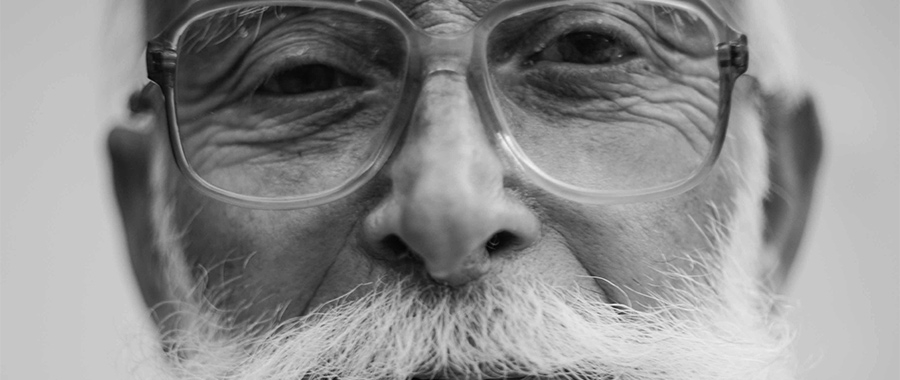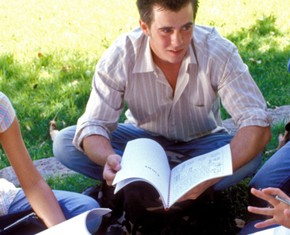The views expressed in our content reflect individual perspectives and do not represent the authoritative views of the Baha'i Faith.
I first heard about the Baha’i Faith in a song from a wonderful soul named John Cook. The lyrics he sang said: “Glory not in this that you love your country, glory in this, that you love mankind.”
Just a teenager in high school at the time, but seriously committed to doing all I could for peace, those words and the resonant way John sang them struck a deep chord in my soul—a chord I didn’t even know existed before I heard his song.
I realized, immediately, that I fervently desired to know where those words came from, who originally said them, and how I could help internalize and carry that powerful message. I had to find out, as the song urged, how to become a world citizen rather than just the citizen of one nation. I wanted to understand, mostly, how to get what John Cook already had—the inner peace that shone out through his music with the intent of creating the outer global peace he advocated.
As we became friends, I soon learned from John that the message in his song came directly from the founder of the Baha’i Faith, Baha’u’llah: “Let not man glory in this that he loveth his country, let him rather glory in this that he loveth his kind.” – Tablets of Baha’u’llah, pp. 127-128.
Yesterday John Cook died.
I hadn’t seen my friend John in the past few years, so it shocked me when I started weeping with grief after I learned of his death. I’m not much of a crier, but overcome by emotion all night and into the next day, my eyes red and swollen from the tears I shed, unable even to talk on the phone because my voice kept breaking, I wondered: Why am I having such a strong reaction? What’s causing this emotional earthquake I’m feeling? Where does this torrent of tears come from?
Then it struck me—I wept because John was my spiritual father. I realized I was grieving for my true father—not the biological one, but the spiritual one. No wonder I felt his passing so profoundly. He was one of many who taught me about the Baha’i Faith and modeled its great beauty, but John said the word “Baha’i” to me before anyone else ever did, and it changed my entire life.
You would’ve loved the guy. Many, many people did. Funny, intensely bright, perceptive and loving, he flew airplanes, rode horses, sang and played guitar with tremendous talent and force, raised a wonderful family and laughed hard and often.
But John didn’t just sing about a more beautiful world—he walked his talk. John spent most of his life around America’s indigenous people, especially the western tribes like the Apache and the Navajo, and became a legend on their reservations, because he did everything he possibly could to make their lives better. He cared nothing for status, money or power. He had the opportunity, the charisma and the talent to become a star, but never wanted it. Without much of a formal education, he knew the deepest truths. He could see right into your soul. Honest, authentic and spiritual to his core, John became a role model for hundreds of young people like me. He served the Baha’i community selflessly for his entire life, dedicating whatever he made or did or accomplished to the fortunes of those who had less than he did. He lived his whole life in kindness, forthright, bold and completely dedicated, in word and deed, to the Baha’i principle of the oneness of humanity.
John first opened my mind and my soul to the hidden mysteries, the spiritual realities of life. His songs, inspired by the Baha’i teachings, penetrated powerfully into my psyche and made me want to aspire to something new. His vision allowed mine to grow. His faith inspired me and gave me the gift of envisioning my own nascent faith. The way John lived his entire life—dedicated to an ideal, a set of beautiful Baha’i principles, a greater cause—motivated me to try to do the same. In my younger years, he became my soul’s archetype, showing me an example of what a spiritual being could look like. By setting a different, compelling standard, he helped me recreate my life.
Have you ever had a spiritual parent like John? The Baha’i teachings say that:
The spiritual father is greater than the physical one, for the latter bestoweth but this world’s life, whereas the former endoweth his child with life everlasting.
… that is better than having physical children; for such children are not grateful to their fathers, since they feel that the father serveth them because he must—and therefore no matter what he doeth for them, they pay it no mind. Spiritual children, however, are always appreciative of their father’s loving kindness. This verily is out of the grace of thy Lord, the Beneficent. – Abdu’l-Baha, from a tablet translated from the Persian, cited in Baha’u’llah’s Most Holy Book, p. 185.
Yes, John’s kindness to me definitely emerged “out of the grace of thy Lord, the Beneficent.” It couldn’t have come from anywhere else. Twenty years older than me, he had no need to hang around with a callow teenager and suffer my endless questions—but he did, with tact, patience and generosity. He did it out of love—the love for all humanity the Baha’i teachings had instilled in him. I felt that love, and it changed me.
It took me a while to understand that John had his own struggles, as we all do. Like any parent, he wasn’t perfect, and he freely recognized his imperfections. As I grew into an adult, I learned that John didn’t want anyone to idolize him. He made it clear that he worked hard to try to model his life on the life of Abdu’l-Baha, the true exemplar for all Baha’is. Characteristically, John saw himself as a very poor and unsuccessful student of that lofty standard. But his humility, his recognition of his flaws and failings, and his devotion to a high moral and spiritual paradigm all proved that he had fought his spiritual battles, had the scars to prove it, and had come away with many personal victories. That inspired me, too.
If I were writing this essay on paper, you would see the wet marks of my tears on the page. Thinking about John this morning, I realized my emotions meant something more than just grief and sadness. They mean that I’m eternally grateful for John’s loving kindness, for taking a confused, rootless kid and showing me how to live the life of the spirit.
















Comments
Sign in or create an account
Continue with Googleor